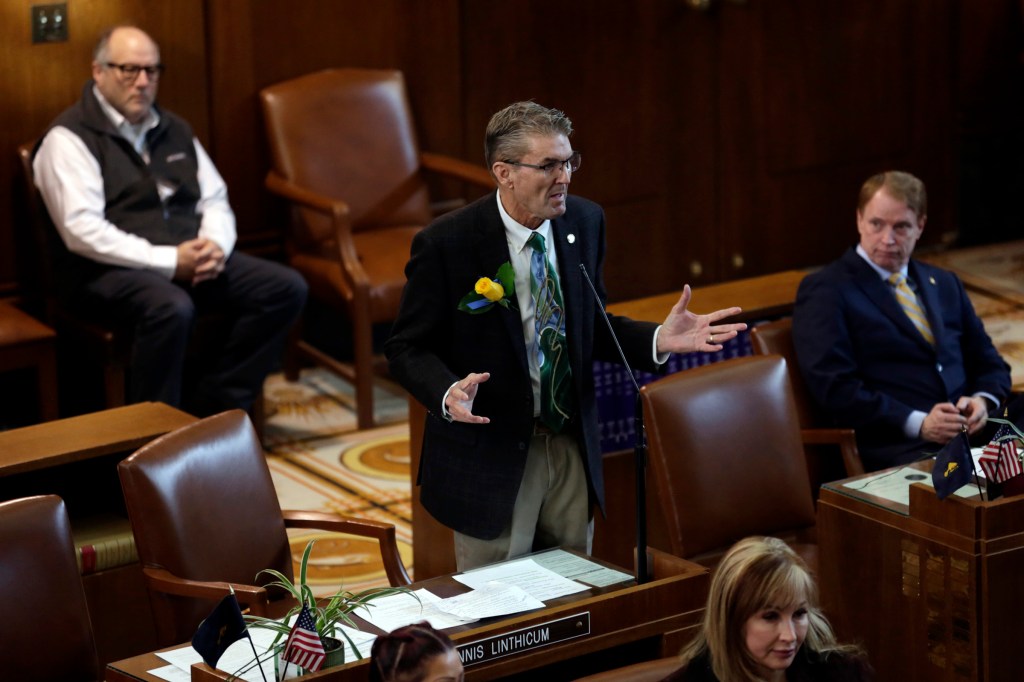Legislature logjam as guns, abortion, rent control bills percolating
Published 5:30 pm Monday, April 24, 2023

- Sen. Dennis Linthicum, R-Klamath Falls, standing, speaking on the floor of the Senate in January 2023, as Senate Minority Leader Tim Knopp, R-Bend, seated at right, looks on. Knopp and Linthicum represent most of Deschutes County in the Senate and their seats are on the ballot in 2024. They plan to fight a state law that would bar them from re-election because of unexcused absences during the Senate GOP walkout that stalled the 2023 legislative session.
The Oregon Senate on Monday had much to do and didn’t do much of it, while the House came and went in a little over an hour — the result of a GOP slow-down in the Senate that has created a logjam of legislation.
The Senate had 24 bills up for final votes Monday when the day’s session began at 10:30 a.m.
Trending
By 3 p.m., two had been considered — and passed. In addition to requiring the full reading of bills before a vote, numerous Senate Republicans commented on the bills, extending the waiting time for a vote.
The House considered two resolutions and a largely pro forma bill to ensure that if the state budget due by June 25 was somehow delayed, current levels of funding would continue until the new budget was finalized. The House adjourned after one hour and nine minutes of official activity.
The 160-day session officially began on Jan. 17. Tuesday will mark two months to the date – June 25 – the Oregon constitution requires the Legislature to adjourn for the year.
Hot-button issues arriving for floor votes
After a quiet Monday, the House will see its tempo and the temperature of issues rising beginning Tuesday.
The legislative conveyor belt of bills from committees to the House floor includes a bill limiting insurance companies from cancelling or raising rates on properties because of their location in possible wildfire areas.
Trending
In an earlier deal between House Speaker Dan Rayfield, D-Corvallis and House Minority Leader Vikki Breese-Iverson, R-Prineville, Democrats agreed to delay bringing bills on abortion access, transgender health rights, and gun control to the House floor until May. In exchange, Republicans have not required recent, mostly non-controversial bills, to be read in full on final passage.
In the Senate, the situation was far less collegial. Senators slogged through each piece of legislation with a full reading of the bill, copious comments from lawmakers that extended the debate on each piece of legislation. The reading and comments on two relatively uncontroversial bills took up the entire morning session of the Senate.
When it came time to vote, a bill to rename the “Board of Property Tax Appeals” to “Property Value Appeals Board” passed 16-12. A largely technical bill to clean-up language in transactions conveying title of property, which had passed the House 60-0, was approved by the Senate 26-2. Then the Senate recessed for lunch and committee hearings.
Delaying tactics could mean longer Senate sessions
Sen. Michael Dembrow, D-Portland, wrote in a constituent letter over the weekend that GOP actions were “filibuster techniques.”
The escalating battle will require lawmakers to be in Salem as much as six or seven days a week in May.
Senate President Rob Wagner, D-Lake Oswego, scheduled a second session to begin at 5 p.m. that could run until 9 p.m.
Wagner has said if Republicans continue to slow voting, he will add double sessions- morning and afternoon.
Dembrow said in his newsletter this weekend that in May, the Senate could go to Friday and weekend sessions as well, which are usually off-days for lawmakers to return to their districts.
Knopp countered in his own newletter, released Monday evening, that the majority Democrats were pushing bills without Republican review and in some cases, Knopp said, without proper committee approvals.
“With long hours spent on the Senate Floor and more partisan Portland agenda being brought forward, things are continuing to heat up,” Knopp wrote.
A question mark will be how House Republicans handle bill readings when the more controversial subjects — gun control, abortion access and rent control — come to the floor.
One piece of legislation that appears to be on a bipartisan fast track would allow community colleges to offer bachelor’s programs in nursing.
Supporters see it as a way to speed up refilling the ranks of nurses needed to replace those who retired or left the profession during the COVID-19 pandemic.
Senate Bill 523A was opposed by officials of some four-year colleges who traditionally have been the foundation of received a baccalaureate degree. Community colleges have awarded two-year associated degrees, with students then moving on to a university for the final two years of study.
But backed by heavy support from community college officials and some medical professional groups, the bill passed the Senate 28-0, with two senators excused for business away from the Capitol.
The bill is scheduled for a hearing on Tuesday in the House Higher Education Committee.
The committee is expected to approve the bill and send it to the House for a final vote. It would then go to Gov. Tina Kotek for approval.
Likely lean state budget leaves out major projects
The 2023-25 state budget is also taking shape with a likelihood there will be little room for new program and projects since the Legislature already passed major funding for affordable housing, homeless projects and incentives for the state’s semiconductor industry.
Among the projects that so far don’t appear to have legislative support or the backing of the governor are major new projects at state universities.
The universities’ wish list includes $45 million in state bonds sought by Oregon State University-Cascades to build a health and recreation center. Student fees would pay for an additional $15 million of the total projected $60 million price tag.
Lawmakers are waiting for the quarterly state budget forecast on May 17. It will be the last before the budget bills will come up for a vote.
The Oregon Constitution requires a balanced budget and the forecast will decide if there is additional funds or conversely, will require more cuts.
Last chance to comment on state budget: The Joint Ways and Means Committee will hold a virtual hearing on May 3 from 5 p.m. to 7 p.m. Those interested can sign-up for two-minute comments on the video feed or submit written comments. For more information go to the Ways and Means webpage.





